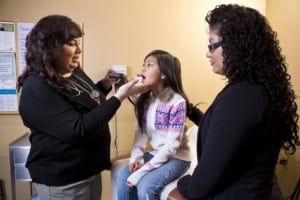Prepare, Prevent, and Protect Against Respiratory Illness
By Southcentral Foundation Public Relations and Corporate Communications

Connect with your primary care team to learn more about respiratory illness and ways you can stay protected.
As Alaskans, we expect the snow to fall, sun to shine, and fish to run each year. Just as we expect these annual events, we can also anticipate the seasonal flu, COVID-19, and respiratory syncytial virus. Fortunately, there are steps you can take during months with higher rates of respiratory illness to keep yourself, your family, and your community protected.
“While it’s encouraging to see the decreasing impact of COVID-19 in the community, it’s important to remember that it’s still around and causing severe illness, especially in high-risk people,” Southcentral Foundation Medical Director Dr. Michael Cooper said. He also advised customer-owners to remember other serious respiratory viruses, such as influenza and RSV, and the steps you can take to reduce the impact on yourself and loved ones.
Protect against the flu
It is recommended most people ages 6 months and older receive a flu vaccination every year beginning in September or October. Alaska has year-round flu activity peaking between November and March, so it is never too late to receive your flu vaccine. The flu vaccine is effective for up to six months, making it essential to receive each year. While the flu vaccination cannot guarantee you will not get the flu, it can reduce your risk of severe illness.
Protect against COVID-19
May marked the end of the global COVID-19 pandemic. While the pandemic has ended, COVID-19 and other variants are still present. Alaska Native and American Indian people are at a higher risk of COVID-19-related hospitalizations, illnesses, and death. Your best defense against contracting and spreading COVID-19 is staying up to date on vaccines and boosters, practicing physical distancing, staying home when you are sick, and getting tested if you have symptoms.
Prevent RSV
RSV is a common respiratory virus that people usually experience cold-like symptoms but can cause serious lower respiratory infections such as bronchiolitis and pneumonia. Infants, children, and Elders are most likely to develop serious RSV that may result in hospitalization. RSV vaccines for those at risk are not available yet but are being developed. To reduce the risk of getting and spreading RSV:
- Avoid kissing, sharing utensils, and holding/shaking hands with those who have symptoms.
- Cover your coughs and sneezes, and wash your hands often.
- Avoid being around others if you are sick and sanitize highly used surfaces often.
Staying home when you are sick, handwashing, and staying up to date on vaccines are measures we all can take to prevent the spread of respiratory illnesses such as the flu, COVID-19, and RSV.
For more information, please contact your primary care team directly or through MyHealth.


